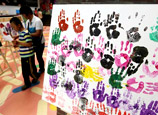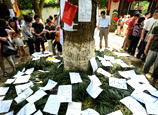
 |
| Expatriates in Shanghai donate blood in Shanghai's Qingpu district on Sunday. Gao Erqiang / China Daily |
Five months after last donating blood, Zachary Ludington - along with more than 150 other expatriates in Shanghai - came to the city's blood donation event on Sunday.
"I came here with two of my friends who also want to donate blood. I will donate months later, because doctors said there should be an interval between donations," the US citizen said.
Ludington, who has been in Shanghai for five years, works in the marketing department of Shanghai East International Medical Center.
Ludington did more than just donate - he is trying to organize more foreign blood donors with his friends.
"I know that donating blood in China is not a common thing as it is in the US and other countries. So I want to do more to help more foreigners understand the situation in China," he said.
Ludington and his friends have carried out many activities in Shanghai's expat communities and also organized foreigners to participate in the city's blood donation events.
"Each month we get five to 10 foreigners to donate blood," he said.
For those first donors, concerns about safety come with the spirit of offering.
"This is my first time to donate blood in China. I have donated blood many times in my country," said Michael Long, a US student who has been at Fudan University for two years. "When I heard about this event, I decided to join it."
He also admitted that many foreigners are still concerned about the safety of donating blood in China after a large number of farmers in Henan province were infected with HIV in the 1990s during blood collection programs in which contaminated equipment was used.
"For foreigners who just arrived in the country, they may have some concerns. But after living awhile in the city, their worries diminish," Ludington said.
Officials from the Shanghai Blood Administration Office said employees have been using disposable medical devices when collecting blood, and other equipment has undergone rigorous disinfection. And the whole blood collecting process strictly complies with rules and procedures.
"Shanghai has seen a growing number of foreign volunteers become blood donors, which has helped meet the city's demand for rare blood types," said Zhu Yueguo, director of the Shanghai Blood Administration Office, which on Sunday organized the event in Oriental Land, a popular travel and leisure destination in Qingpu district.
Zhu said that each year, about 1,300 foreigners donate blood in the city.
"The city was short of Type A, Type O and RH-negative, which are rare among Asian people but more common among Westerners," Zhu said. "Compared with foreign residents, local people seem less aware of blood donations and are unwilling to do so."
The blood donation rate in Shanghai has had a low level of 1.3 percent of its population for years, narrowly above the 1 percent minimum line set by the World Health Organization, which means the blood donations can only meet the basic needs of emergencies and first aid, the Shanghai Blood Administration Office said.
In developed countries, the blood donation rate is 4 to 4.5 percent, Zhu said.
"In hospitals, many surgeries have to be scheduled based on the blood availability. For those patients with rare blood types, it means they have to wait a longer time," Zhu said.
In recent years, the city has tried to encourage blood donations through public health education.
During this year's World Blood Donor Day on June 14, the Shanghai Blood Administration Office will work with Shanghai Media Group Arts Creation Center to launch a public musical drama, I Will Be With You. The musical drama, the first of its kind in the country, aims to encourage more young people to donate blood.
















 Couple say 'I do' after 35-year wait
Couple say 'I do' after 35-year wait


![]()
